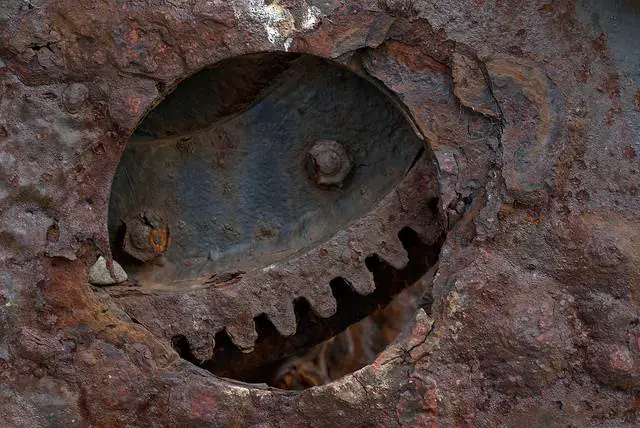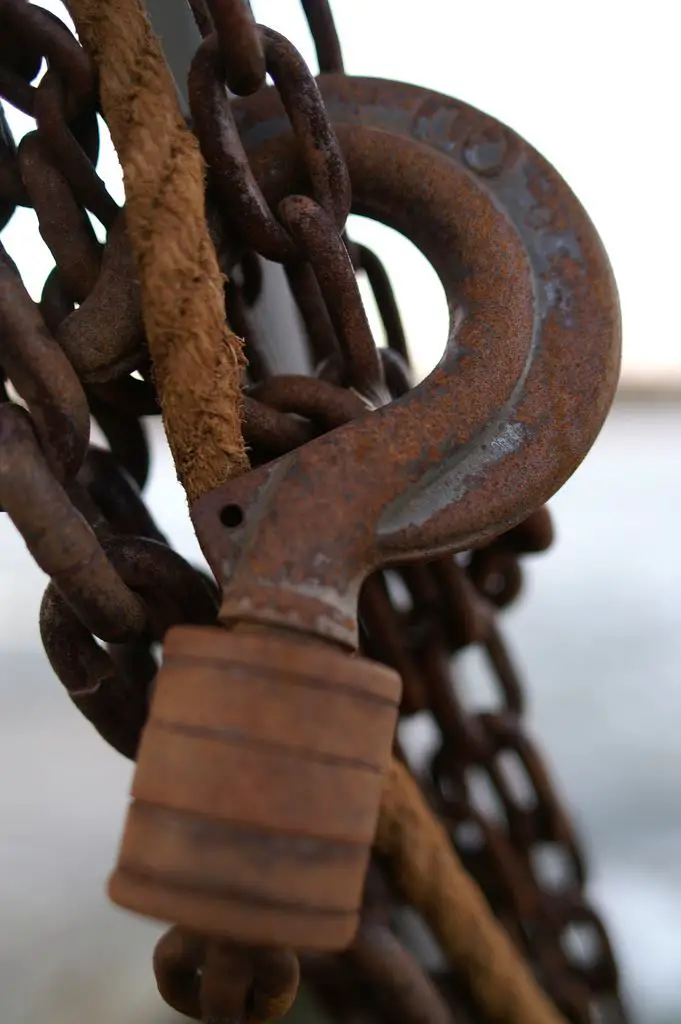
People who work in forging(oxides), cooking(carbon debris and grease), and concrete(ceramics), sometimes finding themselves having to clean up TOUGH messes. In these situations, a wimpy wire brush will not cut it. In these situations, you want a REAL brush that can grind through many everyday materials. In these situations, you are going to want a butcher block brush.
What Is A Butcher Block Brush?
Now as I mentioned before, these things are not some inadequate wire brush. These things have bristles made of spring steel. These are hard bristles capable of scratching, scraping, and borderline planing many types of materials.
These tools are very popular among blacksmiths, as they are great at removing scale, which is an undesirable buildup on their heated stock.
They are also used to clean up tough food related messes.
What Is a Butcher Block Used For
Scraping (duh).
What Is A Butcher Block NOT Used For
A butcher block is overkill for many applications. You would not want to use these tools for cleaning up scale in a bathtub for example. These brushes would tear right through the fiberglass that makes up your tub.
You would not want to use this tool on wood, countertops, or any other material that is soft relative to steel.This tool is capable of chewing through many common household materials, so use some common sense when deciding whether or not it is good for your project.
Best Butcher Block Brush For BlackSmithing
While I believe that these brushes were originally made for kitchen work, they have become incredibly useful for smiths. So which brush should you buy? Which one is best? I will get to that, but first I think there is some helpful information to go over first.
Do I need a butcher block for blacksmithing?
I recommend one for blacksmithing, they are sturdier than wire brushes and hold up better to the demands of manual forging. They are a godsend for the removing scale that naturally builds up while the heated iron reacts to oxygen.
Remember, heat generally tends to speed up chemical reactions. This is obviously relevant for blacksmiths, who may work at very high temperatures.
What Is Scale, And Why Is A Butchers Block Helpful?
Iron is by mass one of the most common ores on planet earth. This is great for blacksmiths, metallurgists, and other builders, as iron can be transformed into steel. However, despite being one of the most common elements on earth, it is rarely found in its elemental form….
Why is this? Why do you care? What does this have to do with butcher block brushes?
Simple, iron is highly reactive to oxygen. This means that iron easily forms oxides (rust) while it’s being worked with – for example, while a blacksmith is forging. These oxides can destroy the texture and aesthetic of the piece being worked.
So Which Butcher Block Brush Should I Buy?
Pretty straight forward so far right? So if you are looking for a brush for your shop, which one should you get? I mean, these tools are not super expensive , especially in the context of contemporary metal working equipment, but it still makes sense to buy the best butcher block possible!
To put it simply, my recomendation is this brush. Why this one? To put it plainly, I believe it’s on of the best made brushes on the market…and I’m not alone, just look at the reviews!
One of the most important things about this particular brush is the handle. This might not seem like a huge deal, but many of the cheaper options do not have a handle on the back of the scraper. Remember, these are not your momma’s wire brushes. If you don’t have a handle, you are much more likely to get a finger caught under these bristles….
And those bristles will cut you to the bone. With a handle that allows me to firmly grasp the brush, I can get the control I need for my projects, while saving my hand from a gruesome fate.
The benefit of this simple handle can’t be understated.
So what are some of the downsides? It can’t be all good right?
Right, while I believe this particular brush is very durable as far as butcher block brushes go, it will still wear down over time, especially in a heavy duty production environment. This is true for all brushes, even butcher block brushes.
This mean you can expect to replace it after some time. It’s hard to give specifics, as it largely depends on the nature of the work, how hard you press, how many hours it’s in use, etc etc.
All in all though, I think this is a solid brush that will hold up over a long period of use.

How to use a butcher block (Scaling brush) for blacksmithing
So now that you have your fantastic brush, how do you use it while blacksmithing? The simplest answer is: whenever you damn well please. But I know that’s not very helpful, so I will go over some of the mistakes I see beginners make:
- Don’t use your brush while the stock is white hot. This is a waste of precious heat. Remember your stock is rapidly cooling once it is outside your forge. The white hot heat is incredibly valuable, as you can move metal much much quicker. Wait until the metal is a dark cherry red and has almost lost its color to use the brush. This ensures you are not wasting your time scraping off scale while the stock is hot, especially since scale will just reform on the surface anyway…
- You don’t always have to brush by hand. It can be handy in some situations to set the brush up on a stand next to the anvil. This allows you to quickly scrap your stock without having to switch tools in your hammer hand. Just make sure the stand is in a safe place, you don’t want to run into these bristles….ouch!
- Try a lighter touch at first, a lot of beginners are used to wimpier brushes, and they tend to really put their weight behind the brush. Less is more in this case, there is no sense replacing the ugly scale with ugly wire gouge marks! This will also help your tools last longer.
- While butcher block brushes are incredible tools to use while the stock is red hot, don’t forget your cold working tools like files and grinders. Butcher block brushes are just one tool in your toolbox.
Using A Butcher Block Brush In the Kitchen (Cooking)
I’ll be honest, I use these tools for blacksmithing and not cleaning up grills and such, but I noticed there is very little information on this tool for kitchen cleaning; so I thought it might be useful to say a little bit on this purpose.
This tool can clean just about anything, but it will be way too aggressive for countertops, tables, tubs, and just about anything that is not also made of metal. This tool can scrape up most household materials, so use with caution.
Conclusion
In conclusion, a butcher block brush is a great tool for cleaning and removing scale while blacksmithing. I recommend one to all new blacksmiths.
They would be very tedious to make by hand, so I recommend buying one over on amazon.
Regardless of your blacksmithing experience, I hope this article was useful for you. Happy Smithing!